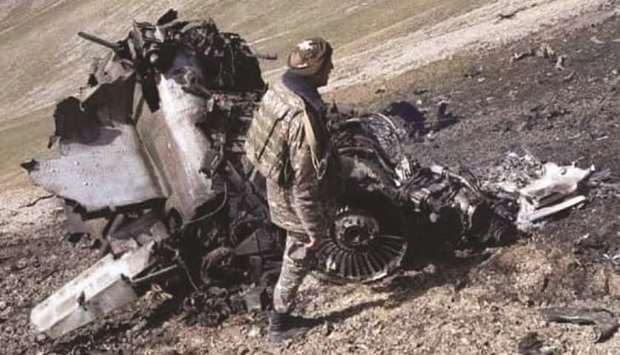Armenia and Azerbaijan yesterday vowed to keep fighting and rejected international calls for negotiations as clashes over the disputed Nagorny Karabakh region raged for a fourth day.
In the breakaway province’s capital Stepanakert, the streets were calm but dark yesterday evening, with public lighting shut off.
Some shops were open and there were no sounds of shelling or fighting in the city, which local authorities said had come under fire when a new round of violence over the region erupted on Sunday.
Armenian and Azerbaijani forces are engaged in the heaviest fighting in years over Karabakh, an ethnic Armenian province that broke away from Azerbaijan in the 1990s during the collapse of the Soviet Union.
The confirmed death toll yesterday surpassed 100 people including civilians and both sides are claiming to have inflicted heavy losses on opposing forces.
Baku and Yerevan have ignored mounting international pressure for a ceasefire, as fears grow that the conflict could escalate into all-out war and draw in regional powers like Turkey and Russia.
Moscow, which has a military pact with Armenia but also good ties with Azerbaijan, has repeatedly called for an end to the fighting and yesterday offered to host negotiations.
In separate phone conversations with his counterparts from both ex-Soviet countries, Russian Foreign Minister Sergei Lavrov reaffirmed Moscow’s “readiness” to organise a meeting.
But the leaders of both countries showed no signs of being ready for talks.
Azerbaijan’s President Ilham Aliyev promised his military would keep fighting until Armenian troops withdraw fully from Karabakh.
If “the Armenian government fulfils the demand, fighting and bloodshed will end, and peace will be established in the region,” he said during a visit with wounded soldiers.
Armenian Prime Minister Nikol Pashinyan said it was not “very appropriate” to speak of negotiations “at a time of intensive hostilities.”
In the Armenian capital Yerevan, dozens of men — some already wearing military fatigues — lined up outside a recruitment office to join the fight.
“We must act to defend our homeland against the aggressor,” said Kamo, a 32-year-old factory worker. “This is our land. We will die before we abandon it.”
There has been no let-up in the fighting since the weekend, with both sides reporting new civilian casualties yesterday.
Officials in both countries have made claims of huge losses for the other side, but these have not been possible to verify.
The Armenian side has recorded 81 military deaths and 23 civilians — eight Armenians and 15 Azerbaijanis — have been reported dead.
Azerbaijan’s defence ministry yesterday claimed its forces have killed 2,300 Karabakh separatist troops since hostilities broke out.
The ministry said its forces had “destroyed 130 tanks, 200 artillery units, 25 anti-aircraft units, five ammunition depots, 50 anti-tank units, 55 military vehicles”.
Karabakh’s defence ministry, for its part, said Azerbaijani forces “continued artillery shelling” against positions along the frontline.
The two sides have accused each other of targeting civilian areas, including in areas away from Karabakh.
Yerevan is claiming that Turkey, a longstanding ally of Azerbaijan, is providing direct military support for Baku.
It said on Tuesday that a Turkish F-16 flying in support of Baku’s forces had downed an Armenian SU-25 warplane, but Ankara and Baku denied the claim.
Russia’s foreign ministry yesterday said that “fighters of illegal armed groups including from Syria and Libya” were being deployed to the conflict zone.
It said it was “deeply concerned” but did not say who was responsible or lay any blame.
“We are definitely very close to seeing a large-scale war, possibly even on a regional scale,” Olesya Vartanyan of the International Crisis Group said. “If we see mass civilian casualties...that will be a very strong pretext for any regional power — no matter Russia or Turkey — to intervene,” she said.
Karabakh’s declaration of independence from Azerbaijan sparked a war in the early 1990s that claimed 30,000 lives, but it is still not recognised as independent by any country, including Armenia.
Armenia and Karabakh declared martial law and military mobilisation on Sunday, while Azerbaijan imposed military rule and a curfew in large cities.
Talks to resolve the conflict have largely stalled since a 1994 ceasefire agreement.
France, Russia and the US have mediated peace efforts as the “Minsk Group”, but the last big push for a peace deal collapsed in 2010.

A man stands by the remains of an Armenian SU-25 warplane reportedly downed during fighting with Azerbaijan over the breakaway Nagorny Karabakh region.
